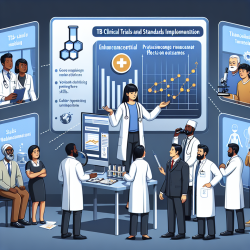Introduction
As a practitioner, you are always on the lookout for innovative ways to enhance your clinical skills. One such skill, crucial for diagnosing abdominal conditions, is palpation. A recent study titled "Effects of using an abdominal simulator to develop palpatory competencies in 3rd year medical students" has shed light on the potential of simulation-based training to improve palpation skills. Let's dive into how you can leverage these findings to boost your expertise.
The Power of Simulation
Simulation-based training has revolutionized medical education by offering a safe and controlled environment for practice. The study focused on the AbSim abdominal simulator, a tool designed to enhance palpatory skills by providing real-time feedback on the depth, location, and thoroughness of palpation. This feedback allows students to adjust their techniques and improve their performance significantly.
Key Findings
The research involved third-year medical students who used the AbSim simulator during their family medicine rotation. The results were promising:
- Students showed significant improvement in palpation depth and thoroughness after training.
- Confidence levels increased among students who initially lacked confidence in their palpation skills.
- There was no correlation between prior clinical experience and initial palpation performance, highlighting the unique value of simulation training.
Why Should Practitioners Care?
For practitioners, especially those involved in training medical students or new clinicians, these findings underscore the importance of incorporating simulation-based training into educational curricula. By adopting such tools, you can ensure that learners develop essential clinical skills more effectively and confidently.
Implementing AbSim in Your Practice
Here are some steps to consider if you're interested in integrating simulation training into your practice:
- Evaluate Your Needs: Determine the specific skills that would benefit from simulation training.
- Select the Right Simulator: Choose a simulator like AbSim that provides comprehensive feedback and is aligned with your training goals.
- Integrate into Curriculum: Incorporate simulation sessions into your regular training programs to reinforce learning.
- Monitor Progress: Use the simulator's feedback to track improvements and identify areas needing further practice.
Encouraging Further Research
While the study provides valuable insights, it also opens doors for further research. Practitioners are encouraged to explore additional applications of simulation in medical training and to share their findings with the broader medical community. This collaborative approach can lead to continuous improvements in educational methodologies.
Conclusion
Simulation-based training, as demonstrated by the AbSim study, offers a promising avenue for enhancing palpatory skills in medical students and practitioners alike. By adopting such innovative tools, you can ensure that your practice remains at the forefront of medical education and patient care.
To read the original research paper, please follow this link: Effects of using an abdominal simulator to develop palpatory competencies in 3rd year medical students.










